The Works of John Newton (6 vols.)
Digital Logos Edition
Overview
John Newton was one of the key figures in the evangelical movement in eighteenth century England. As a slave trader, Newton experienced a powerful conversion after he was nearly shipwrecked. As the spiritual mentor of William Wilberforce, Newton was influential in the abolitionist movement. He also preached before the British Parliament and wrote extensively on political issues. After leaving behind the slave trade, Newton became an influential preacher, a prolific writer, and an author of hundreds of hymn texts—which are included in this collection. In fact, “Amazing Grace,” which Newton wrote, has become arguably the most popular hymn ever written.
The Works of John Newton contains Newton’s most important sermons, hymns, letters, political and social tracts, and other writings—nearly 4,000 pages of material. The Logos edition contains the edition first published in 1820 in London by Hamilton, Adams & Co.—the same text which underlies the 1985 Banner of Truth reprint, the scholarly standard.
Although Newton is remembered for his preaching, his hymn-writing, and his outspoken support of the abolitionist movement, he also wrote hundreds of letters, which are included in this collection. The Works of John Newton also contains Richard Cecil’s 129-page biography, first published in 1809, two years after Newton’s death. This biography includes factual information on Newton’s life and reflections on his legacy and influence.

- Text from the 1820 Hamilton, Adams & Co. edition—which also underlies the 1985 Banner of Truth reprint
- More than 300 letters and pieces of correspondence
- Includes Newton’s thoughts on the slave trade
- More than 100 sermons and topical reflections
- All Scripture references linked to the Bibles in your library
In few writers are Christian doctrine, experience, and practice more happily balanced than in the author of these letters, and few write with more simplicity, piety, and force.
Grace, like water, always flows downward, to the lowest place. I know no one who embodies this principle better than John Newton . . .
—Philip Yancey, author, Grace Notes
I keep John Newton on my selectest shelf of spiritual books . . .
—Alexander Whyte, Professor of New Testament, New College, 1909
He moved in the lowest and vilest circles and sank to the depths of vice, and yet there emerges from this stormy story a man who not only commands the affection of any humane soul, but who showed himself then and afterwards capable of the highest Christian graces.
—Erik Routley, pastor and hymn writer
- Title: The Works of John Newton (6 vols.)
- Author: John Newton
- Publisher: Hamilton, Adams & Co.
- Volumes: 6
- Pages: 3,858
This title is included in the following collections
You can save when you purchase this product as part of a collection.
Biblioteca Portfólio 2025
$1,999.99$1,399.99Logos 5 Anglican Platinum Lega...
$1,499.99$1,499.99Biblioteca Colecionador 2025
$3,499.99$2,449.99Logos 6 Anglican Diamond Legac...
$2,999.99$2,999.99
- $2,999.99
- $4,749.99
- $4,749.99
- $11,399.99
- $11,399.99
- $24,999.99
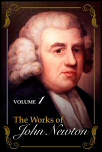
The first volume of Newton’s Works contains Richard Cecil’s 129-page memoir of Newton. First published as a stand-alone monograph in 1809, two years after Newton’s death, Cecil’s biography of Newton was included with the publication of Newton’s Works in 1820. The biography includes factual information on Newton’s life, along with reflections on his legacy and influence—which began to emerge only a few short years after his death.
In addition to Cecil’s biography, this volume also contains more than one hundred letters and pieces of correspondence written by John Newton, including letters to students, family members, members of Newton’s church, and numerous others. This correspondence reveals personal and spiritual matters, thoughts and opinions on prayer, temptation, and other topics, as well as comments on numerous texts of Scripture. Taken together, these letters offer a rare glimpse into the mind and heart of John Newton.
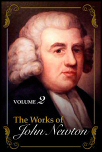
Volume 2 of Newton’s Works includes dozens of discourses and sermons.
- Six Discourses (or Sermons), as Intended for the Pulpit
- On the Deceitfulness of the Heart
- On the Saviour and his Salvation
- On the Christian Name
- On All Things Being Given Us with Christ
- On Searching the Scriptures
- Twenty Sermons Preaches in the Parish Church of Olney
- The Small Success of the Gospel Ministry Considered
- In What Sense the Mysteries of the Gospel Are Hid from Many
- The Characters of Those from Whom the Gospel Doctrines Are Hid
- The Nature of Spiritual Revelation, and Who Are Favoured with It
- The Sovereignty of Divine Grace Asserted and Illustrated
- Of the Person of Christ
- Of the Authority of Christ
- The Glory and Grace of God Revealed in Jesus Christ
- Labouring and Heavy Laden Sinners Described
- Of Coming to Christ
- The Present and Future Rest of Believers in Christ
- Of the Yoke of Christ
- The Service of Christ Easy and Pleasant to His People
- Believers Cautioned against Misconduct in their Profession
- The Extent and Sanction of the Third Commandment
- The Christian Life Compared to a Race
- No Access to God but by the Gospel of Christ
- Of a Living and a Dead Faith
- Guilt Removed, and Peace Restored
- Of the Assurance of Faith
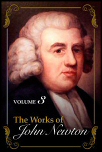
This volume contains Newton’s work on church history. For Newton, this begins in the timeless wisdom and goodness of God, and is revealed in the person of Christ. To understand Jesus, then, is critical for understanding ecclesiastical history. In addition to his exposition of the life of Jesus, Newton also provides a history of the church from the ascension to the end of the first century, including the life of Paul, and the early identification of heresies and false teachers.
The second half of this volume includes hundreds of John Newton’s hymns from his sixteen year pastorate at Olney in Buckinghamshire.
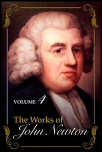
Volume 4 includes Newton’s most popular sermons—50 in all. Originally preached for the edification of his listeners, they have been compiled and published for additional reading and study. These sermons, according to Newton, are designed to reveal to his listeners the essence of Christian belief through understanding the person and work of Jesus himself—“his person, grace, and glory; his matchless love to sinners; his humiliation, sufferings, and death; his ability and willingness to save to the uttermost; his kingdom, and the present and future happiness of his willing people.”
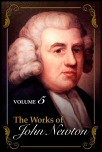
This volume contains three tracts, seven lengthy sermons, and the letters Newton wrote to his wife while he was at sea from 1750 to 1754, and while he traveled in England from 1755 to 1785. Topics include words of encouragement to a minister of an independent church, words of advice for academic preparation for ministry, and sermons on Ephesians, Jeremiah, 1 Thessalonians, Proverbs, and other texts.
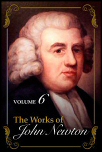
The final volume of Newton’s Works includes 236 letters and writings from Newton to his fellow preachers, to members of his congregation and community, and to unnamed individuals dealing with personal matters and in need of spiritual counsel. This collection also contains memoirs, commentary on social topics, political reflections, and Newton’s own thoughts on the slave trade. The volume concludes with an index to the entire 6-volume set of Newton’s works.
John Newton was born on July 24, 1725, and attended a boarding school in Stratford in Essex, during his childhood years. In 1736, Newton joined the merchant marine, and in March 1744, he set out on the HMS Harwich. His attempted desertion from the royal navy in 1745 led to a severe punishment. Newton was stripped of his rank, and transferred to a slave trading ship in 1748. In 1748, Newton was nearly shipwrecked. The storm initiated a crisis of faith in Newton’s life, and marked the first point of Newton’s conversion. He continued in the slave trade, however, until 1754.
In 1755, Newton returned to England permanently, and began studying the Bible and learning the ancient languages. He became a lay preacher, and was eventually ordained in the Church of England in 1764. He served for many years at the church in Olney in Buckinghamshire, where he became a well-known and much-respected preacher. In 1779, Newton became the rector of St. Mary Woolnoth, and in the 1780s and 1790s, a prominent leader in the evangelical movement in England. He was also influential in the lives of William Wilberforce and other leaders of the abolitionist movement. Newton died in 1807.
Reviews
7 ratings
Ben Buzhardt
10/10/2023
David pauley
1/17/2020

Kevin Bratcher
6/12/2018

Kenneth Bonham
10/9/2015

Denver Race
11/14/2014

Bentley Crawford
8/15/2013

RevSarge
8/5/2013